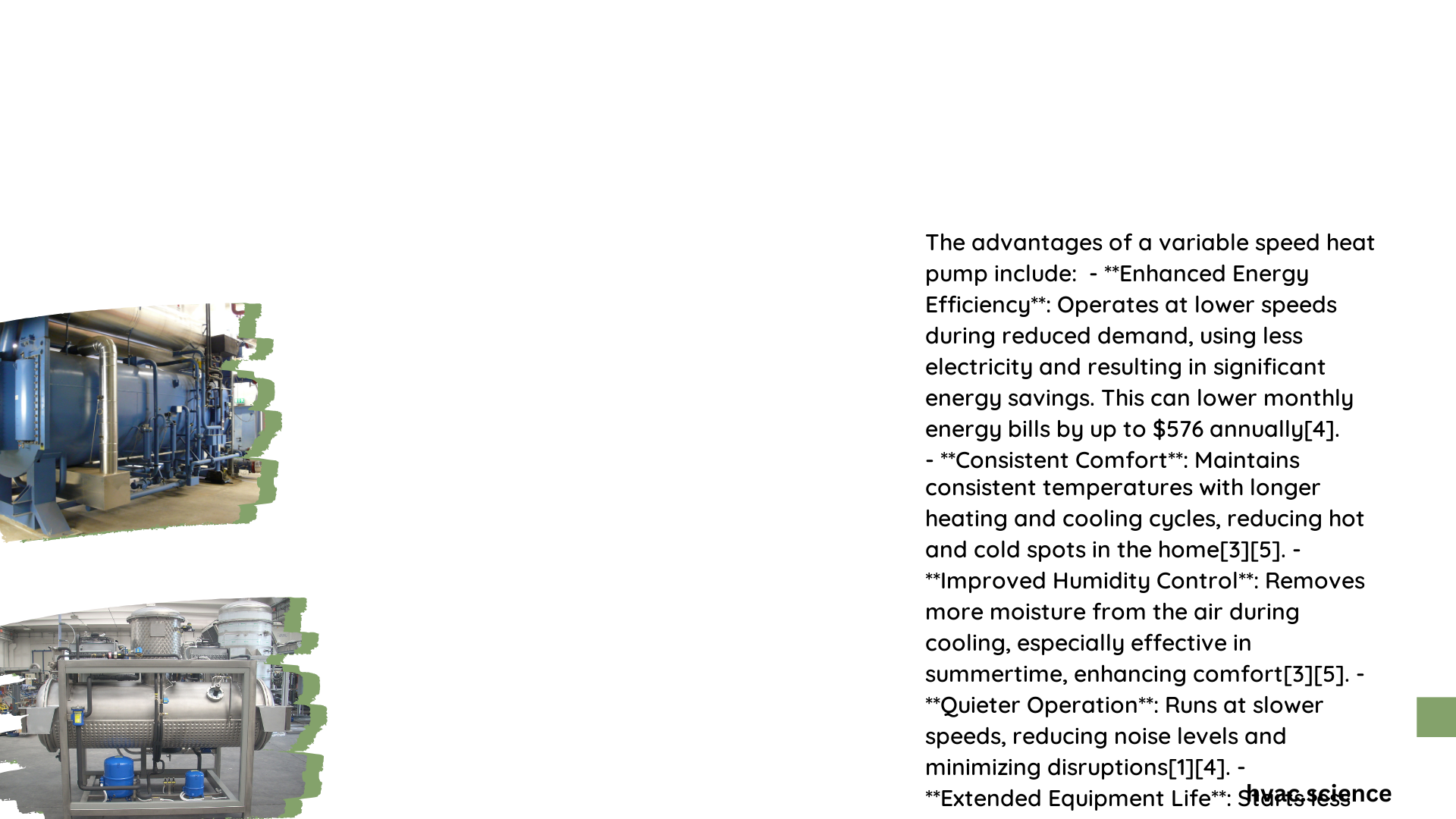Variable speed heat pumps offer superior energy efficiency, quieter operation, and precise temperature control compared to traditional single-speed models. These systems can adjust their output to match the exact heating or cooling needs of a home, resulting in significant energy savings and improved comfort. With higher SEER and HSPF ratings, variable speed heat pumps provide substantial long-term cost benefits despite higher upfront costs.
What Are the Key Energy Efficiency Benefits of Variable Speed Heat Pumps?
Variable speed heat pumps excel in energy efficiency, primarily due to their advanced SEER (Seasonal Energy Efficiency Ratio) and HSPF (Heating Seasonal Performance Factor) ratings. These ratings directly translate to energy savings and reduced utility costs.
SEER and HSPF Ratings Explained
- SEER measures cooling efficiency
- HSPF measures heating efficiency
- Higher ratings indicate greater efficiency
Variable speed heat pumps typically boast:
- SEER ratings up to 42
- HSPF ratings up to 15
These numbers significantly surpass the minimum requirements for single-speed models (13 SEER and 8.2 HSPF).
How Do These Ratings Impact Energy Savings?
The improved efficiency ratings of variable speed heat pumps directly correlate to energy cost savings:
- An 18 SEER2 system is 28.57% more efficient than a 14 SEER2 system
- Each HSPF rating increment results in 10% less energy consumption
For example, a variable-speed inverter heat pump rated at 18.6 SEER2 has been shown to perform at 31.4 SEER2 in real-world conditions – a 68.8% efficiency improvement over its rated efficiency.
How Quiet Are Variable Speed Heat Pumps?

One of the most appreciated advantages of variable speed heat pumps is their quiet operation. This is achieved through their ability to operate at lower capacities, often as low as 25% of their maximum output.
Decibel Comparison
| Heat Pump Type | Typical Decibel Range |
|---|---|
| Variable Speed | 20-40 dB |
| Traditional | 50-70 dB |
Some high-efficiency variable speed models can operate at noise levels as low as 22 decibels, which is comparable to a whisper. This makes them significantly quieter than traditional heat pumps, enhancing the overall comfort of your living space.
What Mechanisms Enable Superior Temperature Control in Variable Speed Heat Pumps?
The superior temperature control of variable speed heat pumps is primarily attributed to inverter technology. This advanced mechanism allows for precise adjustments in compressor speed based on real-time heating or cooling demands.
Key Features of Inverter Technology:
- Continuous modulation of compressor speed
- Optimal operation levels maintained consistently
- Reduced temperature fluctuations
- Improved overall comfort levels
For instance, a variable speed inverter system can maintain a steady indoor temperature of 72°F despite outdoor temperature variations, without the need for full capacity operation. This results in a more stable and comfortable indoor environment compared to the frequent on-off cycling of single-speed models.
How Do Upfront Costs Compare to Long-Term Savings for Variable Speed Heat Pumps?
When considering the adoption of a variable speed heat pump, it’s crucial to weigh the initial investment against potential long-term savings.
Upfront Costs
Variable speed heat pumps generally have higher initial costs compared to single-speed models. For example, a high-efficiency variable speed inverter heat pump like the Carrier Infinity Ductless system can be significantly more expensive than a standard single-speed heat pump.
Long-Term Savings
Despite the higher upfront costs, variable speed heat pumps offer substantial long-term benefits:
- Reduced energy consumption leading to lower utility bills
- Less frequent maintenance requirements
- Extended lifespan due to reduced wear and tear
For instance, a system performing 68.8% more efficiently than its rated efficiency can lead to significant reductions in energy bills over time. Additionally, the reduced strain on components often results in lower maintenance costs throughout the system’s life.
Considerations for Homeowners
When deciding on a variable speed heat pump, homeowners should consider:
- Specific climate conditions
- Heating and cooling needs of their home
- Proper sizing and installation requirements
These factors are crucial in ensuring that the system operates efficiently and effectively, maximizing the potential long-term savings.
In conclusion, while variable speed heat pumps may require a higher initial investment, their superior energy efficiency, quiet operation, precise temperature control, and potential for significant long-term savings make them an attractive option for many homeowners.
References:
1. https://atmospherecomfort.com/heat-pumps-efficiency-ratings-seer-vs-hspf/
2. https://www.wardph.com/efficiency-inverter-heat-pump-ac/
3. https://www.logan-inc.com/blog/convert-hspf-to-hspf2/
